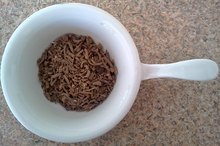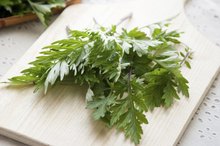Dandelion Root Vs. Dandelion Leaf
The dandelion is also known as a "blow ball,""lion's tooth," or its scientific name, Taraxacum officinale. According to the University of Maryland Medical Center (UMMC) web site, these herbs are rich sources of nutrition including vitamins A, B complex, C, and D and the minerals iron, potassium, and zinc. This alone is good reason to add a few dandelion leaves to your salad. However, before starting the medicinal use of dandelions, be sure to consult your health care provider.
Dandelion Roots & Leaves
The UMMC site says that traditionally, both the roots and the leaves of the dandelion were used to treat liver problems. But these days, the roots are more commonly used to aid digestion, increase the appetite and improve the functions of the gall bladder and the liver. The dandelion's leaves are most commonly used as a natural diuretic to help the body get rid of excess water from bloating or swelling.
The U.S. National Library of Medicine (USNLM) site also indicates that dandelion is used to treat these conditions: cancer, colitis, diabetes and hepatitis B. However, it also warns that not enough clinical study has been done to prove dandelion's effectiveness for treating these conditions.
- The UMMC site says that traditionally, both the roots and the leaves of the dandelion were used to treat liver problems.
Forms of Dandelion Used
Milk Thistle & Dandelion on an Empty Stomach
Learn More
The USNLM reports that the medicinal portions of the dandelion include the roots, the leaves or the entire plant. The leaves are often added to salads or cooked greens and the flowers are even used to make dandelion wine.
Dandelion can be found for sale as tinctures, capsules, dried or fresh greens or a liquid extract. Dandelion is often combined with other medicinal herbs in supplements.
- The USNLM reports that the medicinal portions of the dandelion include the roots, the leaves or the entire plant.
- Dandelion can be found for sale as tinctures, capsules, dried or fresh greens or a liquid extract.
Side Effects
The USNLM says that dandelion is generally considered safe, but rarely it may cause an upset stomach, diarrhea or allergic reaction. However, the UMMC also warns that dandelion may harmfully interact with such medications as lithium, antibiotics, antacids or quinolone. This is why you should tell your health care provider about all supplements you use medicinally.
Research
Dandelion & Breastfeeding
Learn More
The Memorial Sloan-Kettering Cancer Center website describes several animal studies and a few simple human studies that have attempted to determine whether dandelion is an effective treatment. The herb seems to be helpful for lowering cholesterol, decreasing inflammation and stimulating the appetite, but much more study needs to be done before it can be recommended for medicinal use.
Consideration
Taking any new substance can cause an allergic reaction. If you notice a rash, hives or shortness of breath while taking dandelion, discontinue its use and contact your health care provider.
Related Articles
References
- University of Maryland Medical Center: Dandelion
- Memorial Sloan-Kettering Cancer Center: Dandelion
- National Center for Complementary & Alternative Medicine: Dandelion
- Dandelion greens, raw. FoodData Central. U.S. Department of Agriculture. Updated 2019.
- Wild greens. Academy of Nutrition and Dietetics. Updated 2018.
- Vitamin A fact sheet for health professionals. National Institutes of Health. Office of Dietary Supplements. Updated 2020.
- Wirngo FE, Lambert MN, Jeppesen PB. The physiological effects of dandelion (taraxacum officinale) in type 2 diabetes. Rev Diabet Stud. 2016;13(2-3):113-131. doi:10.1900/RDS.2016.13.113
- Vitamin C fact sheet for health professionals. National Institutes of Health. Office of Dietary Supplements. Updated 2020.
- Choi UK, Lee OH, Yim JH, et al. Hypolipidemic and antioxidant effects of dandelion (Taraxacum officinale) root and leaf on cholesterol-fed rabbits. Int J Mol Sci. 2010;11(1):67-78. doi:10.3390/ijms11010067
- Potassium fact sheet for health professionals. National Institutes of Health. Office of Dietary Supplements. Updated 2020.
- Ovadje P, Ammar S, Guerrero JA, Arnason JT, Pandey S. Dandelion root extract affects colorectal cancer proliferation and survival through the activation of multiple death signalling pathways. Oncotarget. 2016;7(45):73080-73100. doi:10.18632/oncotarget.11485
- Ledford DK. Biofreeze allergy and compositae. American Academy of Allergy Asthma & Immunology. Updated 2017.
- Dandelion. Memorial Sloan Kettering Cancer Center. Updated 2019.
- Mahr S. Dandelion, Taraxacum officinale. University of Wisconsin-Madison. Master Gardener Program Division of Extension. Updated 2015.
- Coleman E, Delea K, Everstine K, Reimann D, Ripley D. Handling practices of fresh leafy greens in restaurants: receiving and training. J Food Prot. 2013;76(12):2126-31. doi:10.4315/0362-028X.JFP-13-127
Resources
Writer Bio
Lynn DeVries has more than 15 years of professional freelance writing experience with projects ranging from marketing copy writing to entertainment journalism. She researches and writes about alternative therapies on the Web site Medicinal Herb Info and writes for eHow Home & Garden and LIVESTRONG. Lynn is fond of learning and writing about alternative therapies, the latest gadget, or technology.









